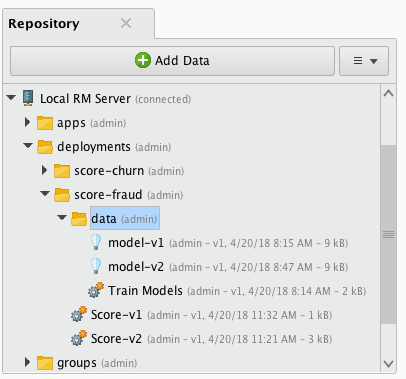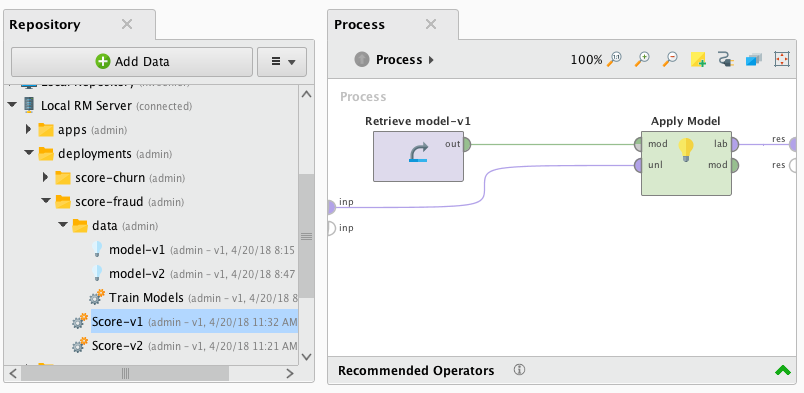You are viewing the RapidMiner Server documentation for version 9.3 - Check here for latest version
Create a deployment file
A deployment file defines web services that are exposed by the Scoring Agent to score data. Following section describes step by step how to create and obtain a Scoring Agent deployment file from RapidMiner Server.
Create a deployment on RapidMiner Server
To create a deployment file for the Scoring Agent create a new folder in the RapidMiner Server repository. The folder can be placed anywhere and will be used to define the contents of the deployment. Keep in mind that everything stored in this folder will be included in the deployment file. This includes processes as well as data and models. Top-level processes of the deployment folder will be exposed as web services.
The image below shows an example deployment folder called score-fraud:

It contains two top-level processes called Score-v1 and Score-v2 and a data/ folder.
The data/ folder contains the production models model-v1 and model-v2 that are used by the top-level processes for scoring and a training process Train Models which builds the models.
In general the Scoring Agent exposes top-level processes of a scoring folder based on following schema:
http://$SA_HOST/services/$folderName/$processName
Therefore the base path of the deployment will be the same as the folder name and the endpoint paths of the two top-level processes will be the same as the process names.
Let's assume the Scoring Agent is running on localhost with default settings.
The full URL of the web services exposed by the score-fraud deployment will look like this:
http://localhost:8090/services/score-fraud/score-v1http://localhost:8090/services/score-fraud/score-v2
The process Train Models will not be available as a web service as it is not a top-level process.
Please note that special characters in the name of the deployment folder and top-level processes will be URL encoded.
A process called score customer stored in the folder customer churn/ will be available as a web service at http://$SA_HOST/services/customer%20churn/score%20customer.
Create a scoring process
Each web service offered by the Scoring Agent relies on a RapidMiner Studio process.
Here's an example of a simple scoring process:

The process will load a previously trained model from the repository and apply it on the input data. Afterwards the scoring results will be delivered to an output port.
The Retrieve operator works only with relative paths and only with data that is contained in the deployment folder or its subfolders.
For easier local testing of a scoring process you can assign input data to the input port via the process context. Or just drag&drop data on the input port.
Download deployment file from RapidMiner Server
The deployment file can now be downloaded from RapidMiner Server either via command line or via browser. Both possibilities are described below.
Downloading the deployment from RapidMiner Server will create a .zip file with a snapshot of the current deployment folder content together with a configuration file that defines the endpoints of deployment.
Download via command line
To trigger the deployment creation via command line you can, for example, use curl or any other tool which fits the needs.
The creation URL is defined as http://$RM_SERVER/api/rest/resources/$LOCATION?format=webservice. Where
$RM_SERVERis the host name of the RapidMiner Server (e.g.localhost:8080)$LOCATIONis the repository location of the deployment folder (e.g.deployments/score-fraud)
So, in our case the URL looks like this:
http://localhost:8080/api/rest/resources/deployments/score-fraud?format=webservice
and an example curl command looks like this:
curl -u user:password 'http://localhost:8080/api/rest/resources/deployments/score-fraud?format=webservice' -o deployment.zip
Download via browser
To trigger the deployment creation via browser you just need to visit the resource URL of your created deployment folder.
The URL is defined as http://$RM_SERVER/internal/rest/resources/$LOCATION?format=webservice. Where
$RM_SERVERis the host name of the RapidMiner Server (e.g.localhost:8080)$LOCATIONis the repository location of the deployment folder (e.g.deployments/score-fraud)
So, in our case the browser URL looks like this:
http://localhost:8080/internal/rest/resources/deployments/score-fraud?format=webservice
What's next?
After you have downloaded the deployment file you can install it on a Scoring Agent.